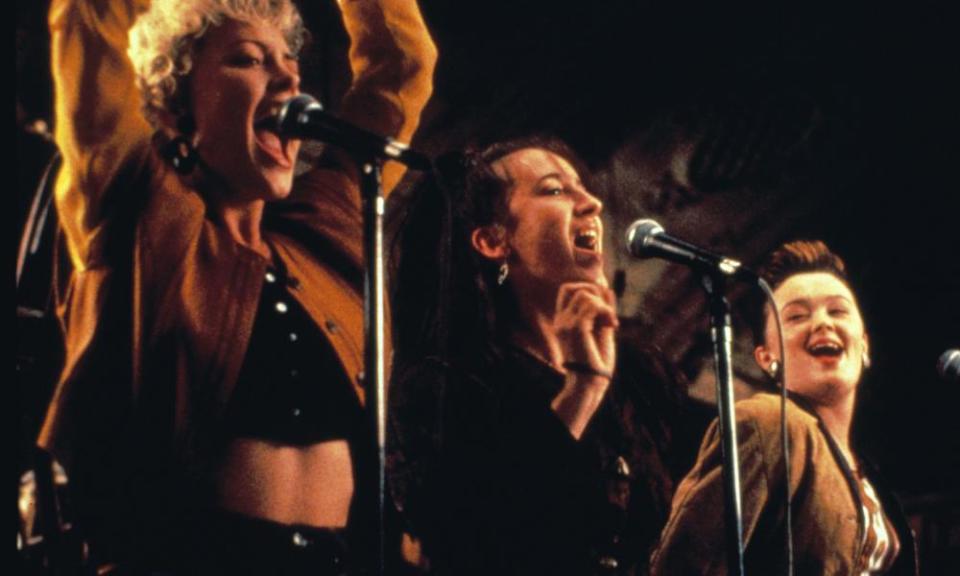Alan Parker, director of Midnight Express and Bugsy Malone, dies aged 76
Alan Parker, the British director behind a string of hits including Midnight Express, Bugsy Malone, and The Commitments, has died aged 76.
The news was announced by a representative, who said he had died on Friday “after a lengthy illness”.
Related: Alan Parker: 'I like the craziness of the film set'
Matthew Modine was among those paying tribute on social media, saying: “Being cast in his epic film, Birdy, transformed my life. Alan was a great artist who’s films will live forever. Godspeed, Sir Alan.” Composer Andrew Lloyd-Webber added: “Very sad to hear the news of Alan Parker’s death. My friend and collaborator on the Evita movie and one of the few directors to truly understand musicals on screen.”
Parker, who was born in 1944 in Islington, London, first made his name in the advertising industry, getting a job as a postroom boy after leaving school and eventually establishing himself as a director. Among his best known TV commercials were for Cinzano, featuring Joan Collins and Leonard Rossiter, and Parker developed a reputation for astute comic ability. However, along with a clutch of contemporaries such as Adrian Lyne and Ridley and Tony Scott, he had ambitions for the big screen and, after the TV film The Evacuees (scripted by Jack Rosenthal), he made his feature film debut with Bugsy Malone – an project that he would later tell the Guardian was “a ludicrous idea that really ought not to work”.
Starring Scott Baio and Jodie Foster, Bugsy Malone was a gangster film featuring kids throwing shaving foam pies and shooting “splurge guns”; it got Hollywood’s attention, and he was hired to direct the Oliver Stone scripted Midnight Express, which garnered Parker an Oscar nomination for its high impact depiction of an American incarcerated in Turkey after being arrested for drug smuggling.
A string of successful films followed, many music based. The performing-arts student musical Fame (1980) spawned a generation’s infatuation with legwarmers, while his subsequent effort, Shoot the Moon, was – in sharp contrast – a drama about marital breakdown starring Albert Finney and Diane Keaton. In the same year, 1982, Parker released Pink Floyd – The Wall, which starred Bob Geldof in a surreal feature film realisation of the hit Pink Floyd album.
Parker returned to Hollywood with the Vietnam war drama Birdy (1984), which starred Matthew Modine and Nicolas Cage; after that came the cult thriller Angel Heart (featuring Robert de Niro as the satanic Louis Cyphre), and civil rights thriller Mississippi Burning (1988) for which he received a second best director Oscar nomination. The exuberant Roddy Doyle adaptation The Commitments was released in 1991. In 1996 he directed Madonna in a film version of Andrew Lloyd Webber-Tim Rice musical Evita, and subsequently adapted Frank McCourt’s memoir Angela’s Ashes, with Emily Watson in the lead role.
Towards the end of the 1990s, Parker unexpectedly emerged as the leading figure in the British film establishment: he was appointed chairman of the British Film Institute (BFI) in 1998 and two years later became the first chairman of the newly formed UK Film Council, which distributed lottery money to the newly resurgent British film industry. He was knighted in 2002. The abolition of the Film Council in 2010 as part of the Bonfire of the Quangos caused him great annoyance: “I was very angry that the government abolished it; it was a petulant, political act.”

However, his film-making career virtually ground to a halt, with The Life of David Gale becoming his final directorial credit in 2003. Parker later told the Guardian: “The truth is, as I get older, the attraction of being up to my knees in Mississippi mud is growing less and less. Film-making is a physically hard job. I have an eight-year-old son, and I see him every day. I was never there for my four grownup children; I was always on location somewhere. That isn’t the kind of life I want any more.
“Having said that, I truly miss the cameraderie of the film set. A lot of directors prefer the solitude of the editing process, but I revel in the craziness of what a film set is. I do miss that.”
In his later years, Parker turned to painting, telling the Observer: “I was very lucky to find such a creative outlet so late in life … and quite separate to my day job as a director. I had been directing since I was 24 years old and it was refreshing to do something creative on my own, without the help of 100 other people. I can honestly say that since I’ve concentrated on the painting full time, the last three years have been the most enjoyable of my life.”
Parker married Annie Inglis in 1966; they divorced in 1992.

 Yahoo Movies
Yahoo Movies 
